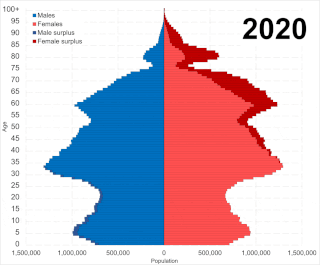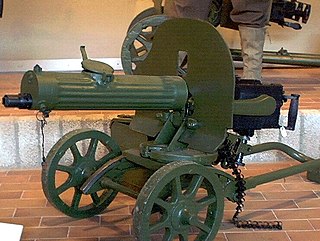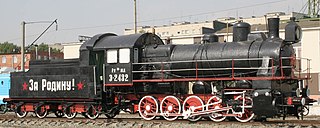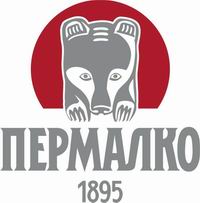
Since the beginning of the 1990s, social and demographic changes in the Russian Federation, stemming from under the Soviet Union, led the country towards an aging population, often described in media as a "demographic crisis".

The "State Anthem of the Union of Soviet Socialist Republics" was the national anthem of the Soviet Union and the regional anthem of the Russian Soviet Federative Socialist Republic from 1944 to 1991, replacing "The Internationale". Its original lyrics were written by Sergey Mikhalkov (1913–2009) in collaboration with Gabriyel’ Arkadyevich Ureklyan (1899–1945), and its music was composed by Alexander Alexandrov (1883–1946). For a two-decade interval following de-Stalinization, the anthem was performed without lyrics. The second set of lyrics, also written by Mikhalkov and in which Stalin's name was omitted, was adopted in 1977.
Vasily Ivanovich Lebedev-Kumach ; 5 August [O.S. 24 July] 1898 — 20 February 1949) was a Soviet poet and lyricist.

The Pulyemyot Maksima PM1910, or PM M1910, is a heavy machine gun that was used by the Imperial Russian Army during World War I and the Red Army during the Russian Civil War and World War II. Later the gun saw service in the Korean War, the Vietnam War and the 2022 Russian invasion of Ukraine.

Evgeny Mikhailovich Belyaev, also written as Yevgeny Belyayev, was a Russian tenor soloist of the Alexandrov Ensemble under Boris Alexandrov. He is remembered in the Soviet Union as the Russian Nightingale and in the West as one of the definitive singers of Kalinka.

The 2000 Moscow Victory Day Parade was held on 9 May 2000 to commemorate the 55th anniversary of the capitulation of Nazi Germany in 1945. The parade marks the Soviet Union's victory in the Great Patriotic War.

The Echelon Song, also known as Song for Voroshilov or Battle of the Red Guards, is a Russian song written in 1933 by A. V. Alexandrov (music) and Osip Kolychev (lyrics), dedicated to Kliment Voroshilov. It is one of a number of popular Soviet songs which reminiscence about the Russian Civil War era. This particular song is about the "railway warfare" during the Battle for Tsaritsyn of 1918, where Voroshilov and Joseph Stalin became friends. The music of the song is composed so as to recall a steam locomotive, beginning in an accelerando and crescendo, and ending in a decrescendo.
Sergei Chuev is a Russian historian specializing in World War II.

The 2005 Moscow Victory Day Parade was a military parade which took place in Red Square in Moscow on 9 May 2005 to celebrate the 60th anniversary of the capitulation of Nazi Germany in 1945. The parade was inspected by the Minister of Defence Sergei Ivanov and it was commanded by Moscow Military District Commander General of the Army Ivan Efremov. Music was performed by the Massed Bands of the Moscow Garrison directed by Colonel Valery Khalilov on his 3rd national parade, the first to include 4 international marching bands. After the inspection of the troops, President of the Russian Federation Vladimir Putin gave his 6th-holiday address to the nation. More than 150 foreign dignitaries were presented. Among them were Secretary General of the United Nations Kofi Annan, European Commission President Jose Manuel Barroso, UNESCO Director General Koichiro Matsuura, President of the United States George W. Bush, President of China Hu Jintao, Japanese Prime Minister Junichirō Koizumi, French President Jacques Chirac, Chancellor of Germany Gerhard Schroeder, President of Kazakhstan Nursultan Nazarbayev and President of Turkmenistan Saparmurat Niyazov. It was the largest parade in the history of Russia, and one of the largest in the world's history.
The 1987 October Revolution Parade was a parade on Red Square to celebrate the 70th anniversary of the October Revolution of 1917. It took place in Moscow on November 7, 1987. Marshal of the Soviet Union and the Minister of Defence Dmitry Yazov inspected the parade. Commanding the parade was the commander of the Moscow Garrison Vladimir Arkhipov. Music was performed by the head of Moscow Garrison's central band, Major General Nikolai Mikhailov. General Secretary of the Communist Party of the Soviet Union Mikhail Gorbachev and other members of the Politburo were on the grandstand of Lenin's Mausoleum in Red Square.
"Life has become better" is a widespread version of a phrase uttered by former Soviet Communist Party General Secretary Joseph Stalin at the First All-Union Meeting of the Stakhanovites on November 17, 1935. The full quote from Joseph Stalin was, when translated into English,
Living has become better, comrades. Living has become happier. And when life becomes happier, work becomes more effective. ... If we lived badly, unattractive, unhappy, then there would be no Stakhanov movement in our country.

Joint-Stock Company Permalko is one of the leading distilleries in Perm and Perm Kray. The company is in the top 20 list of vodka and spirits producers in Russia.
The 1st Army was a field army of the Red Army during the Russian Civil War. The 1st Army was formed twice. The first formation was between the beginning of March 1918 and May as a reaction to the Austro-German occupation of Ukraine. The second formation was created on June 19, 1918, as a part of the Eastern Front and from August 15, 1919 as a part of the Turkestan Front. The Army was disbanded in January 1921.
The 1990 Moscow Victory Day Parade was held on May 9, 1990 to commemorate the 45th anniversary of the Victory of the Soviet Union in the Great Patriotic War. The parade was inspected by the USSR Minister of Defense Marshal Dmitry Yazov, and was commanded by the Commander of the Moscow Military District Colonel general Nikolai Vasilyevich Kalinin.
The Hymn of the Bolshevik Party is a song composed by Alexander Alexandrov. Its lyrics are written by Vasily Lebedev-Kumach. The opening bars of the song is sampled from Life Has Become Better, one of Alexandrov's previous pieces. From the 1930s to the 1950s, this served as the unofficial anthem of the Bolshevik Party. In 2016, Communists of Russia, a Russian communist party, declared that this piece is their party anthem.
The 7th Ukrainian Soviet Division was a military unit of the Red Army during the Russian Civil War in the armed forces of the Ukrainian SSR.

Kazan Law Institute is a Higher education institution in Kazan, founded in 1931 to train lawyers. Reorganized in 1952 by joining the Kazan Federal University.
Andrey Viktorovich Malgin is a Soviet and Russian journalist, literary critic, publisher, blogger, and entrepreneur.








